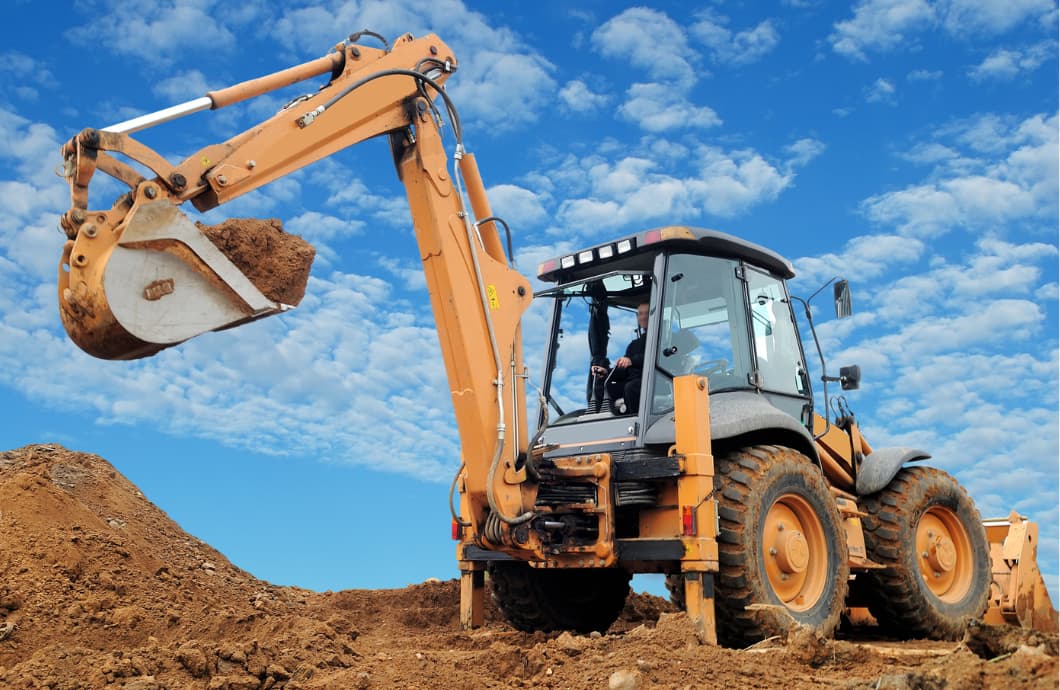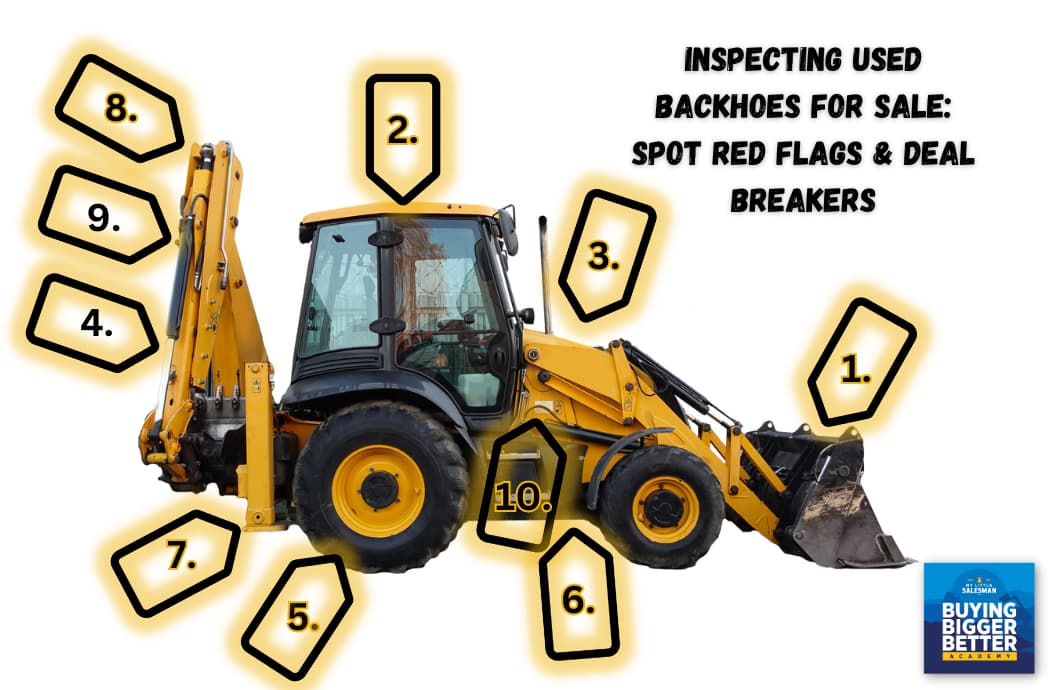
Thinking of adding a backhoe to your crew?
Nice. But to keep it productive and profitable, you’ll want to have any piece of equipment professionally inspected by a heavy equipment mechanic.
But these inspections can run several hundred dollars a piece for your peace of mind. Wouldn’t it be nice to disqualify some backhoes from consideration yourself? Well, you’re in luck!
The following guide is designed to walk you through the key areas to inspect—helping you spot red flags before your mechanic has to.
Remember, this isn't a substitute for a professional mechanic's inspection, but it'll equip you to rule out lemons before they drain your wallet.

1. Inspecting Backhoe Loader Buckets
The condition of the loader bucket says a lot about the treatment or application of a particular loader backhoe.
The loader bucket is your workhorse, so inspect it and the loader arms carefully. The cutting edge shouldn't be worn down by more than half. If it's looking rough, you might need to factor in a replacement cost or consider just how hard this backhoe has been used in the past.
Inspect the bucket pins for excessive wear or rust—both of which can give you an idea of the frequency of use for a piece of equipment.
2. Climb Inside: Inspecting Backhoe Cabs
To get a feel for how used the backhoe might be, hop into the cab and give the seat and controls a feel. Make sure the seat has seat belts, is comfy, and swivels easily. Make sure the glass is clear and free of cracks.
The ROPS (Rollover Protective Structure) shouldn't show any signs of damage. The controls for the loader and bucket should respond without much lag. Don't forget to check the parking brake and service brakes—they should be nice and firm.
Make sure the air conditioning and heating units work well—as replacing those can be expensive and you’ll definitely want them!
3. Backhoe Engine Essentials: Pop the Hood
Now, let's peek under the hood. Check the engine oil and the engine for leaks—it should be clean, not gritty or sludgy. Look for any signs of "blow-by," where gases leak past the piston rings—which can be anything from blowing white smoke to oil film to excessive crankcase pressure.
The air and oil filters should be clean. The radiator should be full of antifreeze. If any major engine parts have been rebuilt, ask for details and receipts.
Just a head's up—most backhoe loaders in North America are going to be diesel engines, so you will want to be familiar with how those function in comparison to petrol gasoline based engines.
4. Hydraulic Headaches: Keeping the Pressure On
Next, let's talk about the hydraulics. These are the muscles that power the backhoe, so you want them in tip-top shape. Take a close look at the hydraulic cylinders. Any scratches or dents could lead to leaks and hinder performance.
Keep an eye out for sluggish performance, grinding or whining noises, too much play, or any visible hydraulic fluid leaks in the system. These could be signs of excessive wear and expensive fixes down the line.
5. Loader Tire Inspections
Give the tires a good going-over. Are the treads worn evenly, or are there any nasty gashes in the sidewalls? Also, inspect the tires for dry rot, cracks, bulges, signs of separation, and if the tires match. Overly worn tires aren't a deal-breaker but should be factored into your budget if you need to replace them soon.
Check the kingpins—the big bolts that connect the steering axle to the wheels. They should be nice and tight. Don't forget to peek at the axles, which should have oil with all the lug nuts present and snug.
6. Backhoe Frame Issues
Now, for the body. Look for any welds or frame cracks—which will only get worse with time. A bent frame could mean the machine was in a rollover accident, and cracks indicate it's been overstressed. Not good.
While a little bit of surface rust is manageable, be on the lookout for excessive rust in critical areas. Some welding repairs are acceptable, as long as they look professionally done. If not, it’s time to start asking questions.
7. Checking Out Backhoe Stabilizers
Like Forrest Gump said—you can tell a lot about a person by their shoes. The same goes for stabilizers. The stabilizers are what keep the backhoe from tipping over when you're digging, so make sure they're in good working order. Check for leaks, and that the pads are in good shape. Don't forget to give the cylinder rods a once-over for scratches.
8. Pinpointing Problems: The Hinged Heroes
As you’re inspecting the backhoe loader, closely examine all the hinge points—especially the bucket cylinder kingpin. If there's rust buildup, it could be a sign the machine has been sitting for a while. Not ideal.
9. Boom, Arm, and Bucket Brigade: Built to Last?
Look for any non-factory welds on the backhoe boom and arm— as these could indicate past repairs. Any evidence of repairs should equal questions about the machine. Also, make sure to check the bucket teeth. They should be sharp and definitely not missing.
10. Inspecting Hydraulic Hoses: Keeping the Juice Flowing
Finally, give the hydraulic hoses a once-over—inspecting each from end to end. Look for any signs of wear, cracks, or leaks. If they're dry and brittle, they're ticking time bombs and you should budget for replacements.
What to Check For When Test Driving a Used Backhoe for Sale
Don't let the excitement of test-driving a backhoe blind you to potential red flags. Listen for engine sputters, groaning hydraulics, steering cylinder moans, and concerning clunks. Test out any four-wheel drive capabilities. Don't forget to test the rear bucket for proper function.
Feel for sluggish movements, unresponsive controls, and vibrations you wouldn't want on a dance floor.These little things can save you big headaches down the road. Make this test drive an investigation—not just a joyride.
Final Checks: Ask to See Repair Maintenance Records
A well-kept backhoe loader will have a record of such keeping. Ask the seller to present repair and maintenance records that attest to the entire machine's keeping throughout its lifetime. Major repairs aren't automatic deal-breakers as long they were conducted professionally.
If the seller can't present many or any repair or maintenance history, this should be a major red flag as you may be buying a "mystery machine."
Remember: This is just a preliminary inspection. Once you've given the backhoe the once-over and identified any potential red flags, it's time to call in the pros for a thorough examination.
Find Your Perfect Backhoe from My Little Salesman
If you're in the market for a used backhoe, head over to My Little Salesman. We've been connecting buyers and sellers of heavy equipment and commercial gear since 1958, and our user-friendly search filters make it easy to find exactly what you need from sellers all over North America. So ditch the lemons and get ready to unearth the perfect backhoe.
Related links: